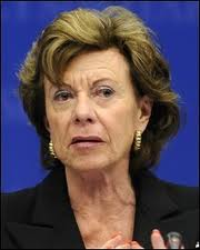On July 12, 2012, the European commissioner Neelie Kroes announced that she will not act to lower prices of optic fiber.
http://www.thejournalofregulation.com/spip.php?article1556

The optic fiber is a very difficult issue for regulators: they want its deployment, for the good of consumers, but they are not willing to pay much more for this and the operators are not prepared to invest without profitability. Incentives are insufficient and uncertainties, major flaw of the regulation, are very large. This is why the European Commissioner in charge of digital, Mrs. Neelie Kroes, announced that on the one hand that the system would now stable for regulation of the optic fiber and that on the other hand there is no more tendency of the regulator to lower the price of access to cost method which discourage operators to invest.
© thejournalofregulation
Regulators have, particularly in the areas of telecommunications, tend to consider that the price of access to infrastructure, particularly in the loop of access networks, must be a price "cost-oriented" and not a "market-oriented" price.
Some economists believe that this makes no sense as a price is always oriented towards the market. If it is differently tilted, it is actually a pricing, which is imposed. This can of course be justified, for the development of the market, the concern that the regulator has of consumers or innovation.
That is why, quite naturally, the European Commission had indicated in October 2011 that about the loop by copper, for which a duty of unbundling is to allow other operators access to critical infrastructure, the price is very oriented costs, thereby generating an incentive for operators owners of this mode of transmission to invest in optic fiber.
But the difficulty is that there we can’t make drinking a donkey that is not thirst... Operators have indicated they would cease to invest in optic fibre, because it was well possible the regulator subsequently imposed a same measure on this new technology that would have required heavy investment.
Regulation becomes difficult, when trust becomes fragile between the sector and the regulator, and the regulator must then take the floor to say what it will do in the future, otherwise operators move more and especially do not invest. Here then is the regulator as Perrette and the pot with milk! Indeed, if no operator is investing, there is more infrastructure of optic fiber, to open. The regulator changed speech.
This was done on 12 July. First, the Commissioner stated publicly that the rules are to stabilize. Indeed, in a regulated sector, the instability of the rules of the game is that operators support the less well, particularly when it comes to making investments in the long term, such as optic fiber. Then, the Commissioner is committed to not force the opening forced the local loop copper (unbundling) for a price excessively oriented to costs. Therefore she publicly admits that unbundling annuity will not be affected.
Thus, the Commissioner said very clearly: "I am aware that the revenues generated by the copper networks are very attractive and that it could diminish excessively motivation to invest in fibre." "This is why I want to restore (this) motivation". Finally, Mrs. Neelie Kroes is going to give a date: 2020. Until then, the price of access to the loop copper (especially for the ADSL) and rules will remain stable. Legal security rights for operators, especially in areas whose dynamism requires from them to long-term investments than other actors, such as the State, could not cope with their place, and whose innovation and consumer need.

your comment